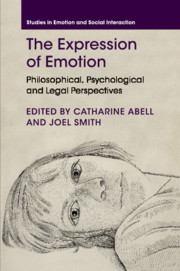Book contents
- Frontmatter
- Contents
- Notes on Contributors
- Acknowledgements
- Introduction: Emotional Expression
- Part I Philosophical Perspectives
- 1 Expressing, Showing and Representing
- 2 Emotions and Their Expressions
- 3 Expressive Actions
- 4 Emotional Expression, Commitment and Joint Value
- 5 Collective Emotion and the Function of Expressive Behaviour
- Part II Psychological Perspectives
- Part III Legal Perspectives
- Index
- Miscellaneous Endmatter
- References
5 - Collective Emotion and the Function of Expressive Behaviour
from Part I - Philosophical Perspectives
Published online by Cambridge University Press: 05 September 2016
- Frontmatter
- Contents
- Notes on Contributors
- Acknowledgements
- Introduction: Emotional Expression
- Part I Philosophical Perspectives
- 1 Expressing, Showing and Representing
- 2 Emotions and Their Expressions
- 3 Expressive Actions
- 4 Emotional Expression, Commitment and Joint Value
- 5 Collective Emotion and the Function of Expressive Behaviour
- Part II Psychological Perspectives
- Part III Legal Perspectives
- Index
- Miscellaneous Endmatter
- References
Summary
Introduction
It is uncontroversial that emotion has a strong social character. Our emotional responses are profoundly influenced by the behaviour and expectations of people around us. Moreover, many emotions have social functions: they enable us to sustain relationships with others and to cope with a range of social challenges (see Helm, this volume). More controversially, it is sometimes suggested that emotional responses can themselves be social phenomena: that emotions can sometimes be experienced collectively in some sense. Whether we can make interesting sense of this claim is a question that is attracting increasing attention from philosophers, reflecting both a flourishing literature in the philosophy of emotion and a vigorous debate about other collective phenomena – collective action and collective cognition, in particular.
In this chapter, I shall explore a new way of approaching this question. Rather than beginning by asking whether emotions themselves can be collective, I shall focus, first, on particular emotional phenomena – specifically, on emotional actions and on processes of reasoning and reflection that arise in the course of an emotional response. I want to consider whether these phenomena can sometimes occur collectively. As I shall explain, this is an interesting question in its own right; moreover, approaching the issue in this way suggests a new way of understanding the claim that emotions themselves can sometimes be collective. As we shall see, investigating these phenomena involves understanding the nature and function of expressive behaviour. Hence, a discussion of expressive behaviour will play a crucial role in what follows.
I begin, in Section 5.2, by explaining why it might be thought that emotions cannot be collective in any interesting sense, and by briefly considering some possible responses to this concern. In Section 5.3, I introduce the question that is my primary focus in this chapter: I explain why it is an interesting question, and how it relates to the broader debate about collective emotion. In Section 5.4, I sketch an account of expressive behaviour; and in Sections 5.5 and 5.6, I draw on this account in describing some potential cases of collective emotional action and reflection. I end, in Section 5.7, by considering what conclusions might be drawn from these cases.
- Type
- Chapter
- Information
- The Expression of EmotionPhilosophical, Psychological and Legal Perspectives, pp. 115 - 134Publisher: Cambridge University PressPrint publication year: 2016

